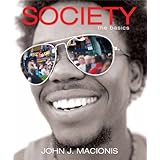
Average Reviews:

(More customer reviews)I have to use this book to teach Sociology 101, and it frustrates me to no end. The book is a failure in every aspect.
Introductory textbooks have to simplify things, of course, but Macionis oversimplifies to the point where my students feel that their intelligence has been insulted, and worst of all, don't realize that the sociological concepts he's talking about are more than simple stereotypes and platitudes. He writes at one point, essentially, that "white people don't understand poverty", while every college freshmen knows that poor whites do exist, and that the author must be either a racist or an idiot for thinking otherwise. But what does the cultural construct of race have to do with social hierarchy and economics? Macionis doesn't start that conversation, you'll have to do it yourself.
And that's the general flaw of the book, Macionis writes chapter after chapter of superficial lists of concepts, theorists, and vocabulary, but never does the real work of laying out key sociological theories in a simple and thorough way, which of course is exactly what a textbook is for. As a teacher, I'm then forced to spend class time laying out the basics that Macionis didn't cover, everything from culture to symbolic interactionism. He'll give a few paragraphs to Weber, Marx, or Freud, but doesn't actually explain them in any coherent way.
Some things are completely absent. Macionis doesn't mention some key concepts, like social capital, and doesn't explain at all how sociologists use statistics. With glaring omissions like those, it's obvious that Macionis simply doesn't understand sociology.
Finally, the book just isn't organized in any worthwhile way. Macionis puts the three big "approaches" (StrucFunc, Conflict, Interaction) in the first chapter, before the students have been exposed to enough material to understand why they're useful or important. Then the rest of the book is a laundry list of concepts, clumped into chapters without any real theme. For example, chapter 4 is about social interaction, status, role, emotion, and humor, but gender, class, race, social groups, and social stratification are spread out in other chapters. Sure, the students learn their vocabulary, but it becomes very difficult to connect the different concepts to each other.
Macionis offers snippets of narrative to help explain the concepts, but nothing big enough for actual analysis, so you'll have to do it instead. All in all, this book does nothing that it's supposed to do, and should not be bought by anyone.
Click Here to see more reviews about:
Society: The Basics (10th Edition)Seeing Sociology in Everyday LifeJohn Macionisshares his enthusiasm, excitement and teaching experiencewith a clear and engaging writing style that connects with students. Macionis', Society: The Basics,10th editionis designed to help students see the relevance of the sociological theories and ideas thatinform their own lives.Four main themes are found throughout the text:Seeing Sociology in Everyday LifeSocial DiversityGlobal ComparisonsCritical ThinkingThe new edition has an innovate new design, contemporary and compelling student applications, plus a wealth of author-written and author-managed supplemental material. This revision elevates Society's high standard of excellence, ensuring that it remains one of the foremost introductory sociology resources for students and instructors alike.
 Get 4% OFF
Get 4% OFF
Click here for more information about Society: The Basics (10th Edition)























